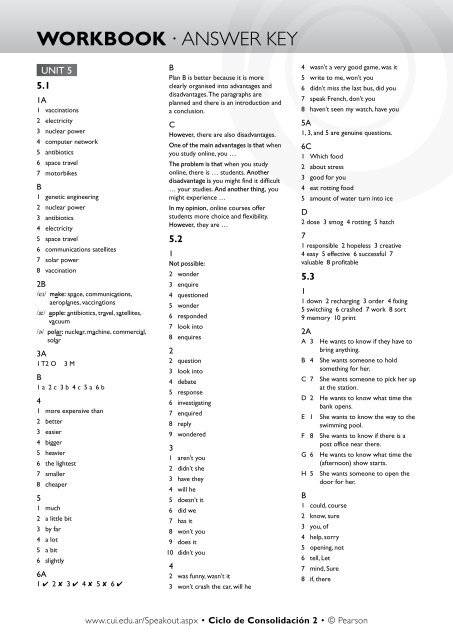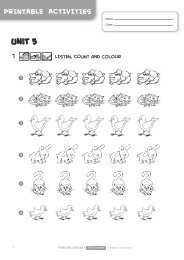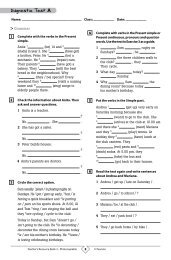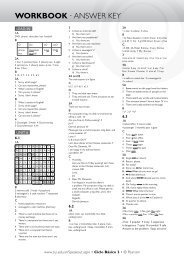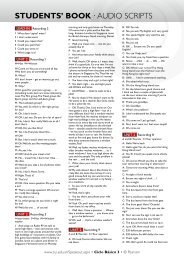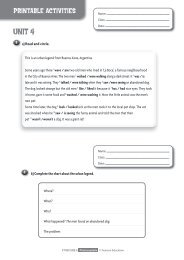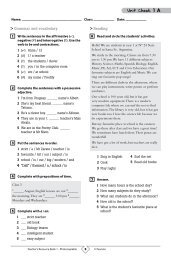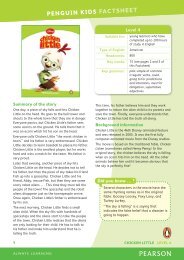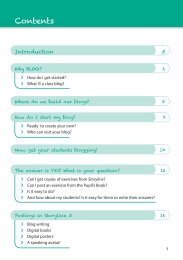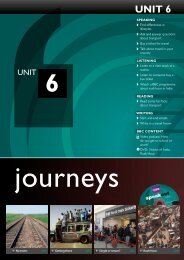WORKBOOK · ANSWER KEY - Pearson ELT
WORKBOOK · ANSWER KEY - Pearson ELT
WORKBOOK · ANSWER KEY - Pearson ELT
Create successful ePaper yourself
Turn your PDF publications into a flip-book with our unique Google optimized e-Paper software.
<strong>WORKBOOK</strong> · <strong>ANSWER</strong> <strong>KEY</strong><br />
Unit 5<br />
5.1<br />
1A<br />
1 vaccinations<br />
2 electricity<br />
3 nuclear power<br />
4 computer network<br />
5 antibiotics<br />
6 space travel<br />
7 motorbikes<br />
B<br />
1 genetic engineering<br />
2 nuclear power<br />
3 antibiotics<br />
4 electricity<br />
5 space travel<br />
6 communications satellites<br />
7 solar power<br />
8 vaccination<br />
2B<br />
/eɪ/ make: space, communications,<br />
aeroplanes, vaccinations<br />
/æ/ apple: antibiotics, travel, satellites,<br />
vacuum<br />
/ə/ polar: nuclear, machine, commercial,<br />
solar<br />
3A<br />
1 T 2 O 3 M<br />
B<br />
1 a 2 c 3 b 4 c 5 a 6 b<br />
4<br />
1 more expensive than<br />
2 better<br />
3 easier<br />
4 bigger<br />
5 heavier<br />
6 the lightest<br />
7 smaller<br />
8 cheaper<br />
5<br />
1 much<br />
2 a little bit<br />
3 by far<br />
4 a lot<br />
5 a bit<br />
6 slightly<br />
6A<br />
1 ✔ 2 ✘ 3 ✔ 4 ✘ 5 ✘ 6 ✔<br />
B<br />
Plan B is better because it is more<br />
clearly organised into advantages and<br />
disadvantages. The paragraphs are<br />
planned and there is an introduction and<br />
a conclusion.<br />
C<br />
However, there are also disadvantages.<br />
One of the main advantages is that when<br />
you study online, you …<br />
The problem is that when you study<br />
online, there is … students. Another<br />
disadvantage is you might find it difficult<br />
… your studies. And another thing, you<br />
might experience …<br />
In my opinion, online courses offer<br />
students more choice and flexibility.<br />
However, they are …<br />
5.2<br />
1<br />
Not possible:<br />
2 wonder<br />
3 enquire<br />
4 questioned<br />
5 wonder<br />
6 responded<br />
7 look into<br />
8 enquires<br />
2<br />
2 question<br />
3 look into<br />
4 debate<br />
5 response<br />
6 investigating<br />
7 enquired<br />
8 reply<br />
9 wondered<br />
3<br />
1 aren’t you<br />
2 didn’t she<br />
3 have they<br />
4 will he<br />
5 doesn’t it<br />
6 did we<br />
7 has it<br />
8 won’t you<br />
9 does it<br />
10 didn’t you<br />
4<br />
2 was funny, wasn’t it<br />
3 won’t crash the car, will he<br />
4 wasn’t a very good game, was it<br />
5 write to me, won’t you<br />
6 didn’t miss the last bus, did you<br />
7 speak French, don’t you<br />
8 haven’t seen my watch, have you<br />
5A<br />
1, 3, and 5 are genuine questions.<br />
6C<br />
1 Which food<br />
2 about stress<br />
3 good for you<br />
4 eat rotting food<br />
5 amount of water turn into ice<br />
D<br />
2 dose 3 smog 4 rotting 5 hatch<br />
7<br />
1 responsible 2 hopeless 3 creative <br />
4 easy 5 effective 6 successful 7<br />
valuable 8 profitable<br />
5.3<br />
1<br />
1 down 2 recharging 3 order 4 fixing <br />
5 switching 6 crashed 7 work 8 sort <br />
9 memory 10 print<br />
2A<br />
A 3 He wants to know if they have to<br />
bring anything.<br />
B 4 She wants someone to hold<br />
something for her.<br />
C 7 She wants someone to pick her up<br />
at the station.<br />
D 2 He wants to know what time the<br />
bank opens.<br />
E 1 She wants to know the way to the<br />
swimming pool.<br />
F 8 She wants to know if there is a<br />
post office near there.<br />
G 6 He wants to know what time the<br />
(afternoon) show starts.<br />
H 5 She wants someone to open the<br />
door for her.<br />
B<br />
1 could, course<br />
2 know, sure<br />
3 you, of<br />
4 help, sorry<br />
5 opening, not<br />
6 tell, Let<br />
7 mind, Sure<br />
8 if, there<br />
www.cui.edu.ar/Speakout.aspx • Ciclo de Consolidación 2 • © <strong>Pearson</strong>
<strong>WORKBOOK</strong> · <strong>ANSWER</strong> <strong>KEY</strong><br />
3<br />
1 No, of course not.<br />
2 I’m not sure. Let me have a look.<br />
3 Yes, of course.<br />
4 I’m afraid I can’t.<br />
5 Yes I can.<br />
Unit 6<br />
6.1<br />
1A<br />
1 exhausting 2 worried 3 boring <br />
4 annoyed 5 frightening 6 embarrassed <br />
7 confused 8 relaxing 9 satisfied <br />
10 shocked<br />
B<br />
1 boring 2 annoyed 3 exhausting <br />
4 satisfied 5 confusing 6 embarrassed <br />
7 shocking 8 relaxing<br />
2B<br />
Reasons: You’re irritated with someone,<br />
You’re frustrated about something,<br />
People criticise you.<br />
Consequences: You start to shout, You<br />
throw things around, You feel tense.<br />
Solutions: You do physical exercise, You<br />
try meditation, You distance yourself<br />
from the situation.<br />
3<br />
1 increases<br />
2 understand<br />
3 solve<br />
4 situations / things<br />
5 change<br />
6 distance<br />
7 breathing / breaths<br />
8 calmly<br />
4A<br />
1 finds, will / ’ll leave<br />
2 will get, works<br />
3 exercise, live<br />
4 leave, will / ’ll miss<br />
5 will / ’ll start, is<br />
6 is, dance<br />
7 is, eat<br />
8 use, won’t get<br />
B<br />
2 specific – first conditional<br />
3 general – zero conditional<br />
4 specific – first conditional<br />
5 specific – first conditional<br />
6 general– zero conditional<br />
7 general– zero conditional<br />
8 specific – first conditional<br />
5<br />
2 If you go to England, …<br />
3 I’ll tell him you called when I see him.<br />
4 ✔<br />
5 If they arrive early, will you ask them<br />
to wait?<br />
6 If you come to the party tonight, will<br />
you bring a friend?<br />
7 When I go to Krakow, I usually see<br />
my aunt.<br />
8 ✔<br />
9 She will get angry if you say that!<br />
10 I’ll / will go to the doctor tomorrow<br />
if I feel worse.<br />
6A<br />
1 c 2 c 3 a 4 c 5 c 6 b 7 a 8 b<br />
B<br />
1 down 2 on 3 up 4 off 5 on 6 up <br />
7 off 8 off<br />
6.2<br />
1<br />
1 do, experiments<br />
2 watch, programme<br />
3 get, seat<br />
4 hold, sale<br />
5 jump, queue<br />
6 cut, hair<br />
7 raise money<br />
2<br />
2 If she was fast enough, she would /<br />
could play for the team.<br />
3 We could drive to your house if we<br />
had a car.<br />
4 They would pass the exam if they<br />
studied.<br />
5 My life wouldn’t be so easy if I didn’t<br />
have a supportive family.<br />
6 If I had the money, I would buy that<br />
house.<br />
7 I would write to my friends if I wasn’t<br />
so lazy.<br />
8 If you watered your plants regularly,<br />
they wouldn’t look so dry!<br />
9 They would help in the house if their<br />
mother asked them.<br />
10 If I didn’t work on Saturdays, I could<br />
come to the barbecue.<br />
3<br />
2 had<br />
3 would be<br />
4 would introduce<br />
5 had to<br />
6 would change<br />
7 was<br />
8 would be<br />
9 would make<br />
10 wouldn’t let<br />
11 was<br />
12 wouldn’t have<br />
4A<br />
1 If I had more time, I’d learn to ski.<br />
2 If you didn’t work, what would you<br />
do?<br />
3 If they had to move, they wouldn’t live<br />
with me.<br />
4 She’d go out at night if her parents let<br />
her.<br />
5 Where would you go if you had the<br />
chance?<br />
6 I wouldn’t sleep if I drank that coffee.<br />
5A<br />
The topic is which kinds of people are<br />
likely to be victims of crime.<br />
B<br />
2, 3, 4, 6 and 7 are potential victims.<br />
D<br />
2 Yes, (because she isn’t) paying<br />
attention to what’s happening around<br />
her. She isn’t looking at other people.<br />
3 Yes, (because they are concentrating<br />
on the map, not) the people around<br />
them.<br />
4 Yes, (because he didn’t put the<br />
money) in his wallet quickly.<br />
5 No, (because of her positive) body<br />
language. She’s confident, she knows<br />
where she’s going, she’s looking<br />
straight ahead, and she’s probably<br />
moving fast.<br />
6 Yes, (because he’s looking at his feet<br />
and he doesn’t know) who’s around<br />
him.<br />
7 Yes, (because rule number one of<br />
the street is: if you have anything<br />
valuable,) don’t show it.<br />
6A<br />
Summary c<br />
www.cui.edu.ar/Speakout.aspx • Ciclo de Consolidación 2 • © <strong>Pearson</strong>
<strong>WORKBOOK</strong> · <strong>ANSWER</strong> <strong>KEY</strong><br />
B<br />
1 D 2 C 3 B 4 A<br />
C<br />
Maybe, It’s possible that, probably, in all<br />
likelihood, In all probability<br />
6.3<br />
1A<br />
1 pass 2 accident 3 offered 4 place<br />
5 engaged 6 lost 7 failed 8 split 9 won <br />
10 promoted 11 degree 12 bought<br />
B<br />
2 e 3 d 4 a 5 b 6 c<br />
2A<br />
A 4 B 3 C 1 D 8 E 2 F 7 G 6 H 5<br />
B<br />
1 Bad news, as I’m afraid.<br />
2 I’m sorry for to have to tell you, but<br />
we lost the match.<br />
3 I’ve got some good unfortunately<br />
news for you.<br />
4 I’m afraid of I’ve got some bad news.<br />
5 There’s something who I’ve got to tell<br />
you.<br />
6 You’ll never guess what is happened.<br />
7 It’s unfortunately, we were burgled<br />
last night.<br />
8 I’ve got something for to tell you.<br />
3<br />
1 Congratulations, fantastic<br />
2 terrible, sorry<br />
3 Well done, great news<br />
4 awful<br />
5 Have, lucky<br />
6 shame<br />
7 joking<br />
Unit 7<br />
7.1<br />
1<br />
2 focus on<br />
3 hard at<br />
4 get better<br />
5 high achiever<br />
6 believe in<br />
3<br />
1 DK 2 T 3 F 4 T 5 F 6 F<br />
4<br />
1 e 2 b 3 c 4 a 5 f 6 d<br />
5<br />
1 ’ve / have been going<br />
2 ’ve / have been waiting<br />
3 haven’t been sleeping<br />
4 ’s / has been crying<br />
5 ’ve / have known<br />
6 ’ve / have been skiing<br />
7 have … been living<br />
8 Have … been watching, have …<br />
enjoyed / been enjoying<br />
6<br />
1 has been happening<br />
2 haven’t had<br />
3 have been staying<br />
4 has been working<br />
5 ’ve / have been thinking<br />
6 haven’t decided<br />
7 ’ve / have been looking<br />
8 have found<br />
9 ’ve / have been working<br />
10 ’s / has been studying<br />
7A<br />
1 depend on<br />
2 succeed in<br />
3 pay attention to<br />
4 rely on<br />
5 pick up on<br />
6 have a talent for<br />
7 think about<br />
8 have access to<br />
B<br />
1 think about<br />
2 pay attention to<br />
3 depends on<br />
4 pick up on<br />
5 have a talent for<br />
6 have access to<br />
7 succeed in<br />
8 rely on<br />
7.2<br />
1A<br />
1 c 2 a 3 b 4 c 5 a 6 b 7 a 8 c<br />
B<br />
1 hopeless, useless<br />
2 gifted, talented<br />
3 skilful<br />
4 expert<br />
5 have a lot of ability, have an aptitude for<br />
2<br />
1 couldn’t 2 manage 3 remember <br />
4 was 5 could 6 to 7 wasn’t 8 managed<br />
3<br />
Not possible:<br />
1 didn’t manage<br />
2 do able to<br />
3 could<br />
4 can<br />
5 are manage to<br />
6 didn’t able to<br />
7 ’m not manage to<br />
8 could to<br />
9 Do you can<br />
10 Could you<br />
4A<br />
1 ✔<br />
2 a 6 syllables, b 5 syllables<br />
3 ✔<br />
4 a 6 syllables, b 7 syllables<br />
5B<br />
A When Sidis was seven months, he<br />
pointed at the moon and said ‘moon’.<br />
B At eighteen months, he could read<br />
The New York Times.<br />
C At six, he could speak Russian, French,<br />
German and Hebrew.<br />
D Aged nine, he gave a lecture on<br />
mathematics at Harvard University.<br />
E Journalists followed him around and<br />
wrote articles about him but he didn’t<br />
achieve much as an adult.<br />
F He died in 1944, aged 46.<br />
www.cui.edu.ar/Speakout.aspx • Ciclo de Consolidación 2 • © <strong>Pearson</strong>
<strong>WORKBOOK</strong> · <strong>ANSWER</strong> <strong>KEY</strong><br />
C<br />
1 His parents were from Russia. They<br />
moved to New York.<br />
2 William’s first word was ‘door’.<br />
3 William was six when he could speak<br />
Russian, French, German and Hebrew.<br />
4 When he was nine, he gave a lecture<br />
on mathematics at Harvard University.<br />
5 Two years later, he began attending<br />
Harvard University.<br />
6 Journalists ‘followed him around’.<br />
7 His sister said he knew all the<br />
languages of the world and that he<br />
could learn a language in a day.<br />
8 For most of his adult life, Sidis was<br />
‘running away’ from fame.<br />
6A<br />
1 Mistakes: His first word was door, not<br />
moon<br />
He took one day to learn a language,<br />
not one week.<br />
2 Exact words: Journalists followed him<br />
around and wrote articles about this<br />
young genius<br />
Not all childhood geniuses will<br />
produce great things as adults<br />
B<br />
1 Uni (university), yrs (years)<br />
2 &<br />
3 close 2 him<br />
4 THE LIFE OF WILLIAM SIDIS<br />
5 Background<br />
6 leave people alone<br />
7.3<br />
1<br />
1 an MA<br />
2 face-to-face learning<br />
3 an apprenticeship<br />
4 qualifications<br />
5 a certificate<br />
6 a degree<br />
7 a PhD<br />
8 an online course<br />
9 distance learning<br />
10 a driving licence<br />
2A<br />
1 b 2 c 3 c<br />
B<br />
1 a 2 b 3 b 4 b 5 a 6 b 7 b 8 a <br />
9 a 10 b<br />
www.cui.edu.ar/Speakout.aspx • Ciclo de Consolidación 2 • © <strong>Pearson</strong>


